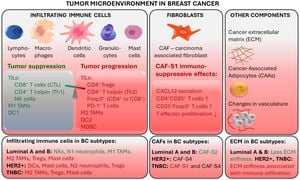A recent study conducted at Sohag University Hospitals has revealed alarming rates of Toxoplasma gondii infection among cancer patients undergoing chemotherapy, highlighting the parasite's role as a significant opportunistic pathogen. The study evaluated 50 cancer patients and 50 healthy controls, employing both serological and molecular diagnostic methods to ascertain the prevalence of T. gondii.
The results found the overall seroprevalence of Toxoplasma IgG to be considerably high, reaching 58%. Notably, seropositivity for IgG was detected at 60% among cancer patients compared to 56% among healthy controls, indicating cancer patients faced double the risk of infection. Researchers observed substantial variation according to cancer type, with solid organ malignancies showing markedly higher seropositivity (77.27%) than hematologic tumors (46.43%).
Among cancer patients, 30% exhibited T. gondii IgG and 9% tested positive for IgM antibodies. Interestingly, the molecular diagnostics revealed only 9% positivity from PCR assays targeting the T. gondii B1 and RE genes. This discrepancy emphasizes the need for refined diagnostic approaches to accurately detect acute or reactivated infections. The limited detection of the parasite’s DNA suggests the challenges of identifying T. gondii, particularly among opportunistically infected immunocompromised individuals.
The study engaged participants aged between 3 and 76 years, all of whom provided informed consent, ensuring adherence to ethical research practices. Samples were rigorously assessed for both IgG and IgM antibodies through commercially available ELISA kits, and molecular analysis was performed via nested PCR.
Given the association of T. gondii with severe conditions like chorioretinitis and encephalitis, the researchers underline the importance of accurate diagnostics. T. gondii predominantly spreads through ingestion of contaminated food or water, making immunocompromised patients, particularly those undergoing chemotherapy, highly susceptible to reactivation of latent infections.
The existing diagnosis methods, primarily serological, failed to confirm the presence of the parasite effectively, especially at low concentrations common among certain patient profiles. To improve diagnostic accuracy, additional molecular methods, including real-time PCR, are recommended to detect T. gondii DNA directly from blood samples or buffy coats.
The statistical analyses indicated no significant correlations between seropositivity rates declining based on the type of cancer experienced by the patients. Nonetheless, cancer type did appear to correlate with higher rates of seropositivity, urging the necessity of timely identification of T. gondii infection. One patient with solid organ malignancy was IgM positive, highlighting the potential for acute infections amid chronic IgG positivity.
This study marks the first thorough examination of the serological and molecular epidemiology of T. gondii within the specific demographic of cancer patients undergoing treatment in Sohag, Upper Egypt. The findings present significant implications for public health, particularly for immunocompromised patients, calling for heightened awareness and improved screening protocols for T. gondii infection within healthcare settings.
Overall, the study advocates for combined diagnostic strategies utilizing both serological and molecular approaches to effectively pinpoint T. gondii infections, which pose grave risks for patients battling cancer. With the need for additional research and larger sample sizes, the results pave the way for future investigations to understand the interplay between parasitic infections and cancer progression.



